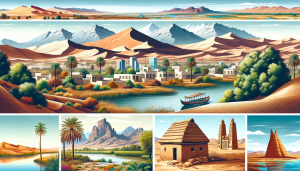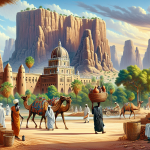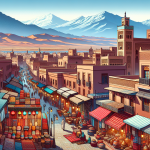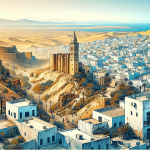Niger: Exploring the Hidden Gem of West Africa
Niger, a landlocked country in West Africa, often remains overshadowed by its more famous neighbors. However, this unassuming nation has a wealth of treasures waiting to be discovered by travelers seeking authentic experiences. From the vast, undulating dunes of the Sahara desert to the vibrant marketplaces of Niamey, Niger offers a blend of natural beauty and cultural richness that is hard to find elsewhere. This article will take you on a journey through Niger’s diverse landscapes, cultural heritage, and hidden attractions, providing you with everything you need to know to plan an unforgettable trip. We’ll explore the bustling capital city, delve into the ancient history of the region, and uncover the unique traditions of its people. Whether you’re an adventure seeker, a history buff, or a cultural enthusiast, Niger has something to offer. So, let’s embark on this journey to discover the hidden gem of West Africa.
The Capital City: Niamey
Niamey, the capital city of Niger, is a vibrant metropolis that serves as the cultural and economic hub of the country. Nestled along the banks of the Niger River, Niamey offers a unique blend of traditional and modern influences. The city is home to a variety of attractions, including bustling markets, fascinating museums, and beautiful parks. One of the must-visit spots in Niamey is the **Grand Market**, where you can immerse yourself in the local culture and find an array of goods, from traditional crafts to fresh produce. Another highlight is the **National Museum of Niger**, which houses a collection of artifacts that tell the story of the country’s rich history and diverse cultures. Additionally, the **Niger River** itself is a major attraction, offering opportunities for boat rides and picturesque views. Whether you’re exploring the markets, visiting the museums, or simply enjoying the scenic beauty of the river, Niamey provides a captivating introduction to Niger.
The Grand Market
The **Grand Market** in Niamey is a bustling hub of activity and a perfect place to experience the vibrant local culture. As you wander through the market, you’ll encounter stalls selling everything from colorful textiles and handmade crafts to fresh fruits and vegetables. The market is also a great place to sample traditional Nigerien cuisine, with vendors offering a variety of street food options. The sights, sounds, and smells of the Grand Market provide a sensory overload that is both exhilarating and immersive. For those interested in shopping for souvenirs, the market offers a wide range of items that reflect the rich cultural heritage of Niger. From intricately woven baskets to beautifully carved wooden statues, you’re sure to find something unique to take home as a memento of your trip. The Grand Market is not just a place to shop; it’s an experience that gives you a glimpse into the daily life and traditions of the people of Niamey.
National Museum of Niger
Another must-visit attraction in Niamey is the **National Museum of Niger**. This museum is a treasure trove of artifacts that chronicle the history and culture of the country. The museum’s exhibits include traditional clothing, musical instruments, ancient pottery, and much more. One of the highlights is the collection of dinosaur fossils, which provides a fascinating insight into the prehistoric era of the region. The museum also features exhibits on the various ethnic groups that inhabit Niger, offering a deeper understanding of the country’s diverse cultural landscape. In addition to its exhibits, the museum grounds are home to a small zoo, which houses a variety of local wildlife. The National Museum of Niger is a great place to learn about the history and culture of the country while enjoying a day out in a beautiful setting.
The Sahara Desert
One of the most iconic features of Niger is the **Sahara Desert**, which covers a significant portion of the country. The Sahara is the largest hot desert in the world and is known for its vast stretches of sand dunes, rocky plateaus, and dramatic landscapes. For adventure seekers, a trip to the Sahara is an opportunity to experience the raw, untamed beauty of nature. Whether you’re riding a camel across the dunes, exploring ancient caravan routes, or camping under the stars, the Sahara offers a sense of adventure and exploration that is hard to match. One of the most popular destinations in the Nigerien Sahara is the **Tenere Desert**, which is famous for its towering sand dunes and rugged terrain. The **Aïr Mountains**, located in the northeastern part of the country, are another highlight, offering stunning landscapes and a chance to explore ancient rock art and archaeological sites. A trip to the Sahara Desert is a journey into a world of breathtaking beauty and timeless mystery.
Tenere Desert
The **Tenere Desert** is a vast and remote region of the Sahara that is known for its strikingly beautiful landscapes. The name “Tenere” means “desert” in the Tamashek language of the Tuareg people, who have traditionally inhabited the region. The Tenere Desert is characterized by its towering sand dunes, which can reach heights of up to 300 feet, as well as its rocky outcrops and barren plains. For those who venture into this remote wilderness, the Tenere offers a sense of solitude and isolation that is truly unique. The desert is also home to a number of historical sites, including ancient rock engravings and the remains of old caravan routes that once connected the region to the rest of Africa. Whether you’re exploring on foot, by camel, or in a 4×4 vehicle, the Tenere Desert provides a truly unforgettable experience.
Aïr Mountains
The **Aïr Mountains** are a mountain range located in the northeastern part of Niger, within the Sahara Desert. The range is known for its dramatic landscapes, which include rugged peaks, deep valleys, and ancient volcanic formations. The Aïr Mountains have been inhabited for thousands of years, and the region is rich in archaeological sites and rock art. One of the most famous sites is the **Dabous Giraffes**, a series of rock carvings that date back to around 8000 BC and depict two life-sized giraffes. The Aïr Mountains are also home to a number of traditional Tuareg communities, who have lived in the region for centuries and continue to practice their traditional way of life. For those interested in trekking and adventure, the Aïr Mountains offer a range of opportunities, from challenging hikes to scenic drives through the rugged terrain. The combination of natural beauty and cultural heritage makes the Aïr Mountains a must-visit destination in Niger.
Cultural Heritage
Niger is a country with a rich and diverse cultural heritage, shaped by the various ethnic groups that inhabit the region. The largest ethnic group in Niger is the **Hausa**, who are known for their vibrant culture and traditions. The Hausa people have a long history of trade and commerce, and their influence can be seen in the bustling markets and traditional crafts of the country. Another significant ethnic group is the **Tuareg**, who are traditionally nomadic and have a deep connection to the Sahara Desert. The Tuareg are known for their distinctive blue clothing and silver jewelry, as well as their rich oral traditions and music. The **Zarma**, **Fulani**, and **Kanuri** are other important ethnic groups in Niger, each with their own unique customs and traditions. The cultural diversity of Niger is one of its greatest strengths, and visitors have the opportunity to experience a wide range of cultural practices and traditions during their travels.
Tuareg Culture
The **Tuareg** people are one of the most iconic ethnic groups in Niger, known for their distinctive blue clothing and rich cultural traditions. The Tuareg are traditionally nomadic, and their way of life is closely tied to the Sahara Desert. They are skilled in navigating the harsh desert terrain and have a deep understanding of the natural environment. The Tuareg are also known for their artistic traditions, including intricate silver jewelry and leatherwork. Music and oral storytelling are important aspects of Tuareg culture, with traditional songs and stories passed down through generations. The Tuareg language, Tamashek, is a key part of their cultural identity and is still widely spoken among Tuareg communities. Visitors to Niger have the opportunity to learn about Tuareg culture through interactions with local communities, visits to traditional camps, and participation in cultural festivals and events. The Tuareg people offer a unique and fascinating insight into the rich cultural heritage of Niger.
Hausa Traditions
The **Hausa** people are the largest ethnic group in Niger and are known for their vibrant culture and traditions. The Hausa have a long history of trade and commerce, and their influence can be seen in the bustling markets and traditional crafts of the country. One of the most important aspects of Hausa culture is their traditional clothing, which is often made from colorful textiles and features intricate embroidery. The Hausa are also known for their music and dance, with traditional drumming and singing playing a central role in cultural celebrations and ceremonies. The Hausa language is widely spoken in Niger and serves as a lingua franca for many of the country’s ethnic groups. Visitors to Niger can experience Hausa culture through visits to local markets, participation in cultural festivals, and interactions with local communities. The rich traditions and customs of the Hausa people provide a fascinating glimpse into the cultural diversity of Niger.
Historical Sites
Niger is home to a number of historical sites that offer a glimpse into the rich history and heritage of the region. One of the most significant historical sites is the **ancient city of Agadez**, which is a UNESCO World Heritage Site. Agadez is known for its stunning mud-brick architecture, including the iconic **Agadez Mosque**, which dates back to the 16th century. The city has long been an important center of trade and commerce, and its historic buildings and narrow streets provide a fascinating insight into the past. Another important historical site is the **Kouré Giraffes Reserve**, which is home to the last remaining population of West African giraffes. The reserve offers a unique opportunity to see these majestic animals in their natural habitat and learn about the conservation efforts to protect them. The **Zinder Sultanate Palace** is another notable historical site, offering a glimpse into the royal history and traditions of the region. These historical sites are just a few examples of the rich heritage that awaits visitors to Niger.
Agadez
The ancient city of **Agadez** is one of the most important historical and cultural sites in Niger. Located on the edge of the Sahara Desert, Agadez has been a major center of trade and commerce for centuries. The city’s most iconic landmark is the **Agadez Mosque**, also known as the Grand Mosque, which is built entirely out of mud bricks and features a distinctive minaret. The mosque dates back to the 16th century and is a stunning example of traditional Saharan architecture. Agadez is also known for its historic buildings and narrow streets, which provide a glimpse into the city’s rich past. The city has a vibrant cultural scene, with traditional music, dance, and festivals playing an important role in the daily life of its residents. Visitors to Agadez can explore the city’s historic sites, visit local markets, and experience the unique culture and traditions of the region. Agadez is a must-visit destination for anyone interested in the history and heritage of Niger.
Kouré Giraffes Reserve
The **Kouré Giraffes Reserve** is a unique and important conservation area located in southwestern Niger. The reserve is home to the last remaining population of West African giraffes, also known as Niger giraffes. These giraffes are a distinct subspecies and are known for their light-colored coats and gentle demeanor. The Kouré Giraffes Reserve offers visitors a rare opportunity to see these majestic animals in their natural habitat. The reserve is also home to a variety of other wildlife, including antelopes, warthogs, and a wide range of bird species. Visitors to the reserve can take guided tours to see the giraffes up close and learn about the conservation efforts to protect them. The Kouré Giraffes Reserve is not only a haven for wildlife but also a beautiful natural area, with stunning landscapes and picturesque views. A visit to the reserve is a must for nature lovers and anyone interested in wildlife conservation.
Zinder Sultanate Palace
The **Zinder Sultanate Palace** is a historic site located in the city of Zinder, which was once the capital of the Sultanate of Damagaram. The palace is a beautiful example of traditional Sahelian architecture, with its intricate designs and ornate decorations. The palace was the residence of the sultans of Damagaram and served as the center of political and cultural life in the region. Today, the Zinder Sultanate Palace is open to visitors, offering a glimpse into the royal history and traditions of the area. The palace complex includes a number of buildings and courtyards, each with its own unique features and historical significance. Visitors can explore the palace, learn about the history of the sultanate, and experience the rich cultural heritage of Zinder. The Zinder Sultanate Palace is a fascinating destination for anyone interested in the history and culture of Niger.
Conclusion
Niger is a country of incredible diversity and beauty, offering a wealth of experiences for travelers. From the vibrant capital city of Niamey to the vast expanses of the Sahara Desert, Niger is a destination that promises adventure, culture, and history. The country’s rich cultural heritage, shaped by its various ethnic groups, provides a unique and fascinating insight into the traditions and customs of the region. The historical sites, such as the ancient city of Agadez and the Zinder Sultanate Palace, offer a glimpse into the past, while the natural beauty of places like the Kouré Giraffes Reserve and the Aïr Mountains provides stunning landscapes and opportunities for exploration. Whether you’re seeking adventure in the desert, cultural experiences in the cities, or a chance to connect with nature, Niger has something to offer every traveler. So, pack your bags and get ready to discover the hidden gem of West Africa.








